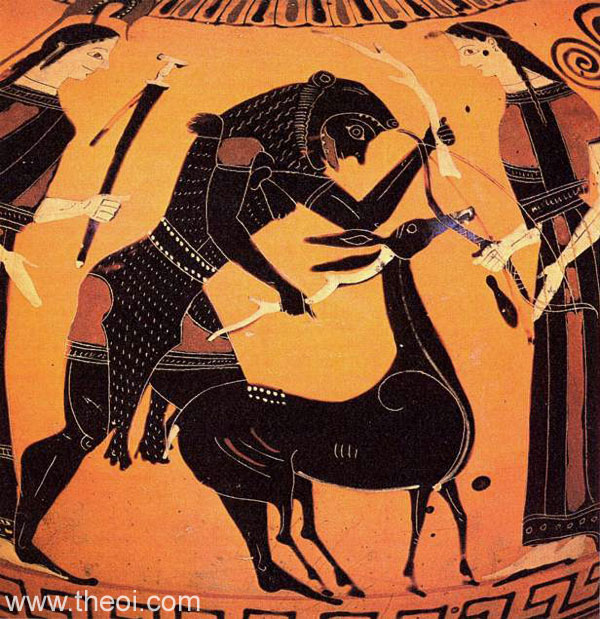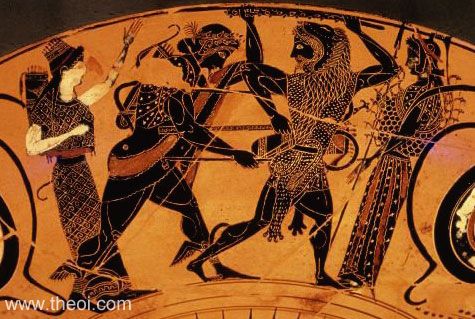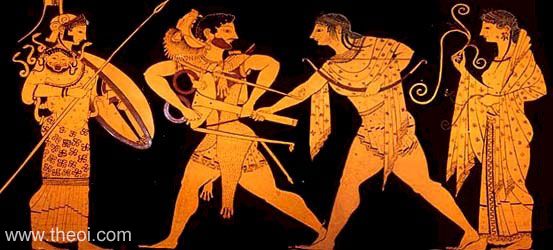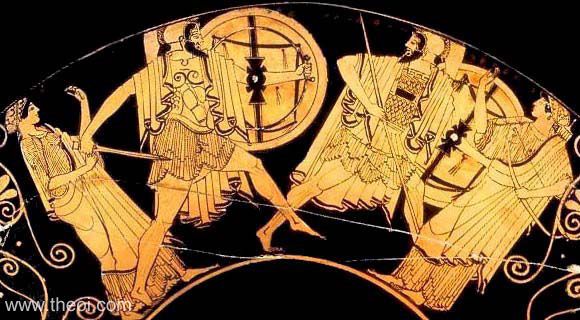ARTEMIS MYTHS 2
Greek Name
Αρτεμις
Transliteration
Artemis
Latin Spelling
Artemis
Translation
Diana

ARTEMIS was the Olympian goddess of hunting, wild animals, children and birth.
This page contains general myths about the goddess including her appearance in the adventures of Herakles and her role in the Trojan War.
CLASSICAL LITERATURE QUOTES
ARTEMIS & THE LIFE OF THE GODS
Homeric Hymn 3 to Pythian Apollo 190 ff (trans. Evelyn-White) (Greek epic C7th or 6th
B.C.) :
"[On Olympos] the Mousai together, voice sweetly answering voice, hymn . . . Meanwhile the rich-tressed
Kharites (Graces) and cheerful Horai (Seasons) dance with Harmonia and Hebe and Aphrodite, daughter of Zeus,
holding each other by the wrist. And among them sings one, not mean nor puny, but tall to look upon and enviable
in mien, Artemis who delights in arrows (iokheira), sister of Apollon. Among them sport Ares and the
keen-eyed Argeiphontes [Hermes], while Apollon plays his lyre stepping high and a radiance shines around him,
the gleaming of his feet and close-woven vest."
Homeric Hymn 27 to Artemis 14 ff :
"[Artemis] goes to the great house of her dear brother Phoibos Apollon, to the rich land of Delphoi, there
to order the lovely dance of the Mousai and Kharites. There she hangs up her curved bow and her arrows, and
heads and leads the dances, gracefully arrayed, white all they utter their heavenly voice, singing."
Pindar, Dithyrambs Heracles the Bold (trans. Sandys) (Greek lyric C5th B.C.)
:
"Wise are they that know what manner of festival of Bromios [Dionysos] the Ouranidai (Gods of Heaven) hold
in their halls, hard by the sceptre of Zeus. In the adorable presence of the mighty Meter Theon (Mother of the
Gods), the prelude is the whirling of timbrels . . . Meanwhile, lightly cometh the lone huntress Artemis, who in
Bacchic revels hath yoked the brood of savage lions for Bromios [Dionysos], who is enchanted even by the dancing
herds of wild beasts."
Statius, Achilleid 1. 344 ff (trans. Mozley) (Roman epic C1st A.D.) :
"When [Artemis] returns wearied to her sire [Zeus] and brother [Apollon on Mt Olympos] from Therapnae,
haunt of maidens, her mother [Leto] bears her company as she goes, and with her own hand covers her shoulders
and bared arms, herself arranges the bow and quiver, and pulls down the girt-up robe, and is proud to trim the
disordered tresses."
Colluthus, Rape of Helen 14 ff (trans. Mair) (Greek poetry C5th to 6th A.D.)
:
"[At the Wedding of Peleus and Thetis:] At the bidding of Zeus, Ganymede poured the wine. And all the race
of gods hasted to do honour to the white-armed bride [Thetis], own sister of Amphitrite: Zeus from Olympos and
Poseidon from the sea . . . Nor did Leto's daughter Artemis, sister of Apollon, disdain to come, goddess of the
wilds though she was."
ARTEMIS & THE LABOURS OF HERACLES

I. HERAKLES & APOLLON STRUGGLE FOR THE TRIPOD
Pausanias, Description of Greece 10. 13. 7 (trans. Jones) (Greek travelogue C2nd
A.D.) :
"[Depicted on a work of art dedicated at Delphoi:] Herakles and Apollom are holding on to the tripod, and
are preparing to fight about it. Leto and Artemis are calming Apollon, and Athena is calming Herakles."
II. HERAKLES & THE KERYNITIAN HIND
Homer, Odyssey 6. 100 ff (trans. Shewring) (Greek epic C8th B.C.) :
"Artemis the huntress ranges the mountain-side - on lofty Taygetos [in Lakedaimonia, home of the Kerynitian
hind], it may be, or it may be on Erymanthos [in Arkadia, home of the Erymanthian boar] - taking her pleasure
among the boars and the running deer."
Pseudo-Apollodorus, Bibliotheca 2. 81 (trans. Aldrich) (Greek mythographer C2nd A.D.)
:
"His [Herakles] third labour was to bring back alive to Mykenai the Elaphos Kerynitis (Cerynitian Hind). It
was at Oinoe, a golden-horned deer sacred to Artemis. In his desire neither to kill nor to wound it, Herakles
spent a whole year pursuing it. Finally the animal tired of the chase and took refuge on the mountain known as
Artemision, and from there proceeded to cross the Ladon River. As it was crossing, Herakles got it with an
arrow, hoisted it on his shoulders pressed on urgently through Arkadia. Artemis along with Apollon accosted him
on the way, reached for the Hind, and berated him for trying to kill her sacred animal. But Herakles pleaded
necessity and said that Eurystheus was to blame, and thus soothed the goddess' wrath; and he brought the animal
still living to Mykenai."
For MORE information on the deer see ELAPHOS KERYNITIS
III. HERAKLES & THE STYMPHALIAN BIRDS
One of the labours of Herakles was to clear away the man-eating birds of Lake Stymphalos. These appear to have been sacred to Artemis, the goddess of the lake.
Pausanias, Description of Greece 8. 22. 4 (trans. Jones) (Greek travelogue C2nd A.D.)
:
"In Stymphalos [Arkadia] there is also an old sanctuary of Stymphalian Artemis . . . Near the roof of the
temple have been carved, among other things, the Stymphalian birds."
For MORE information on the birds see ORNITHES STYMPHALIDES
IV. HERAKLES & THE ERYMANTHIAN BOAR
Another of the Labours of Herakles was to fetch the boar which was ravaging the countryside of Arkadian Erymanthos. Like the Kerynitian Hind and Stymphalian Birds, this appears to have been another of Artemis' sacred animals.
Homer, Odyssey 6. 100 ff (trans. Shewring) (Greek epic C8th B.C.) :
"Artemis the huntress ranges the mountain-side - on lofty Taygetos [in Lakedaimonia, home of the Kerynitian
hind], it may be, or it may be on Erymanthos [in Arkadia, home of the Erymanthian boar] - taking her pleasure
among the boars and the running deer."
For MORE information on the boar see HUS ERYMANTHIOS
V. ARTEMIS & THE RELEASE OF PROMETHEUS
Leto and her children Apollon and Leto petitioned Zeus to allow Herakles set Prometheus free from his long bondage.
Valerius Flaccus, Argonautica 4. 60 ff (trans. Mozley) (Roman epic C1st A.D.)
:
"Latona [Leto] and Diana [Artemis] together stood mournful-eyed before Jove [Zeus], and Apollo thus
supplicating speaks : ‘Until what other Alcides [Herakles] come, until what time indeed, great king, dost
thou put off the old man of Caucasus [Prometheus]? Grantest thou no end at all of punishment and misery? The
whole race of mankind beseeches thee, ay, the very mountains, worthy sire, and weary ridges with their forests
supplicate thee. Sufficiently hast thou punished the theft of fire and safeguarded the secrets of the ethereal
board.’ . . . He [Zeus] moved by the goddesses'tears and Phoebus' [Apollon's] high renown sends down swift
Iris on her rosy cloud. ‘Go,’ he says, ‘let Alcides [Herakles] . . . rescue the Titan from the
dreadful Bird.’"
For MORE information on this Titan see PROMETHEUS

ARTEMIS & THE TROJAN WAR
I. THE SACRIFICE OF IPHIGENEIA
When Agamemnon had assembled the Greek fleet at Aulis, Artemis becalmed the sea, preventing the Greeks from sailing for Troy. The seer Kalkhas declared that the goddess was wrathful with Agamemnon and demanded the sacrifice of his eldest daughter Iphigeneia.
For the MYTH of Artemis, Agamemnon and Iphigeneia see:
(1) Artemis Wrath: Agamemnon
(2) Artemis Favour: Iphigeneia
II. ARTEMIS HEALS THE WOUNDED AINEIAS
In the Iliad, the Trojan hero Aineias was wounded in battle by Diomedes. Apollon lifted him up from the conflict and brought him to his temple where Artemis and Leto tended his wounds.
Homer, Iliad 5. 447 ff (trans. Lattimore) (Greek epic C8th B.C.) :
"Apollon caught [the wounded] Aineias now away from the onslaught, and set him in the sacred keep of
Pergamos [in Troy] where was built his own temple. There Artemis of the showering arrows (iokheaira)
and Leto within the great and secret chamber healed his wound and cared for him."
III. ARTEMIS FIGHTS WITH HERA
After the death of Patroklos, Akhilleus' returned to the war, and Zeus again allowed the gods to return to Troy in support of their favourites. The divine factions then broke out into open conflict: Artemis stood against Hera and was beaten by the goddess.
Homer, Iliad 20. 38 ff (trans. Lattimore) (Greek epic C8th B.C.) :
"[Zeus addresses the gods :] ‘All you go down, wherever you may go among the Akhaians and Trojans and
give help to either side, as your own pleasure directs you . . .’
So spoke the son of Kronos [Zeus] and woke the incessant battle, and the gods went down to enter the fighting .
. . Ares of the shining helm went over to the Trojans, and with him Phoibos of the unshorn hair, and Artemis
lady of arrows (iokheaira), and smiling Aphrodite, Leto and [the river-god] Xanthos."
Homer, Iliad 21. 470 ff :
"[In the conflict of the gods over Troy, Apollon declined to join battle with Poseidon :] But his sister,
Artemis of the wild (agrotera), lady of wild beasts (potnia theron), scolded him bitterly and
spoke a word of revilement : ‘You run from him, striker from afar. You have yielded Poseidon the victory
entire. He can brag, where nothing has happened. Fool, then why do you wear that bow, which is wind and nothing.
Let me not hear you in the halls of my father boasting ever again, as you did before among the immortals, that
you could match your strength in combat against Poseidon.’
So she spoke, but Apollon who strikes from afar said nothing to her; but [Hera] the august consort of Zeus, full
of anger, scolded the lady of the showering arrows in words of revilement : ‘How have you had the daring,
you shameless hussy, to stand up and face me? It will be hard for you to match your strength with mine even if
you wear a bow, since Zeus has made you a lion among women, and given you leave to kill any at your pleasure.
Better for you to hunt down the ravening beasts in the mountains and deer of the wilds, than try to fight in
strength with your betters. But if you would learn what fighting is, come on. You will find out how much
stronger I am when you try to match strength against me.’
She spoke, and caught both of her arms at the wrists in her left hand then with her own bow, smiling, boxed her
ears as Artemis tried to twist away, and the flying arrows were scattered. She got under and free and fled in
tears, as a pigeon in flight from a hawk wings her way into some rock-hollow and a cave, since it was not
destiny for the hawk to catch her. So she left her archery on the ground, and fled weeping . . . Leto picked up
the curved bow and the arrows which had fallen in the turn of the dust one way and another. When she had taken
up the bow she went back to her daughter. But the maiden came to the bronze-founded house on Olympos and the
ambrosial veil trembled about her. Her father Kronides [Zeus] caught her against him, and laughed softly, and
questioned her : ‘Who now of the Ouraniones (Heavenly Ones), dear child, has done such things to you,
rashly, as if you were caught doing something wicked?’
Artemis sweet-garlanded lady of clamours (eustephanos keladeine) answered him : ‘It was your
wife, Hera of the white arms, who hit me, father, since hatred and fighting have fastened upon the
immortals.’"

ARTEMIS & THE INDIAN WAR OF DIONYSUS
When the gods ranged against each other in conflict over the Indian Wars of Dionysos, Artemis stood against Hera in battle and was defeated.
Nonnus, Dionysiaca 32. 100 ff (trans. Rouse) (Greek epic C5th A.D.) :
"The Erinys of many shapes wandered among the hills armed herself against Dionysos [during his war against
the Indians] by Hera's commands [driving him mad] ... Then Artemis saw Bakkhos caught in a fit of mind-marauding
madness, and would have driven the madness away, but Hera with heavy noise aloft cast a burning brand [a
lightning bolt?] to scare her off."
Nonnus, Dionysiaca 36. 28 ff :
"Against Hera came highland Artemis as champion for hillranging Dionysos [when the gods took sides in the
battle of Dionysos' forces against the Indians], and rounded her bow straight. Hera as ready for conflict seized
one of the clouds of Zeus, and compressed it across her shoulders where she held it as a shield proof against
all; and Artemis shot arrow after arrow moving through the airy vault in vain against that mark, until her
quiver was empty, and the cloud still unbroken she covered thick with arrows all over. It was the very image of
a flight of cranes moving in the air and circling one after another in the figure of a wreath: the arrows were
stuck in the dark cloud, but the veil was untorn and the wounds without blood. Then Hera picked up a rough
missile of the air, a frozen mass of hail, circled it and struck Artemis with the jagged mass. The sharp stony
lump broker the curves of the bow. But the consort of Zeus did not stop the fight there, but struck Artemis flat
on the skin of the breast, and Artemis smitten by the weapon of ice emptied her quiver upon the ground."
ARTEMIS & THE BIRTH OF IACCHUS
Nonnus, Dionysiaca 48. 848 ff (trans. Rouse) (Greek epic C5th A.D.) :
"A babe [Iakkhos] came quickly into the light [born of Artemis' companion Aura]; for even as Artemis yet
spoke the word that shot out the delivery, the womb of Aura was loosened, and twin children came forth of
themselves . . .
[The Titanis Aura] sprang up with wandering foot in the wild temper of a shaggycrested lioness [after giving
birth to twins, the product of her rape], tore one child from the wild beast's jaws and hurled it like a flash
into the stormy air: the newborn child fell from the air headlong into the whirling dust upon the ground, and
she caught him up and gave him a tomb in her own maw--a family dinner indeed! The maiden Archeress [Artemis] was
terrified at this heartless mother, and seized the other child of Aura [Iakkhos], then she hastened away through
the wood; holding the boy, an unfamiliar burden in her nursing arm . . . She went about the forest seeking for
traces of Lyaios [Dionysos] in his beloved mountains, while she held Aura's newborn babe, carrying in her arms
another's burden, until shamefast she delivered his boy to Dionysos her brother."
For the PRELUDE to this myth see Artemis Wrath: Aura
For MORE information on these gods see also IAKKHOS and AURA
SOURCES
GREEK
- Homer, The Iliad - Greek Epic C8th B.C.
- Homer, The Odyssey - Greek Epic C8th B.C.
- The Homeric Hymns - Greek Epic C8th - 4th B.C.
- Pindar, Fragments - Greek Lyric C5th B.C.
- Apollodorus, The Library - Greek Mythography C2nd A.D.
- Pausanias, Description of Greece - Greek Travelogue C2nd A.D.
- Nonnus, Dionysiaca - Greek Epic C5th A.D.
- Colluthus, The Rape of Helen - Greek Epic C5th - 6th A.D.
ROMAN
- Valerius Flaccus, The Argonautica - Latin Epic C1st A.D.
- Statius, Achilleid - Latin Epic C1st A.D.
BIBLIOGRAPHY
A complete bibliography of the translations quoted on this page.